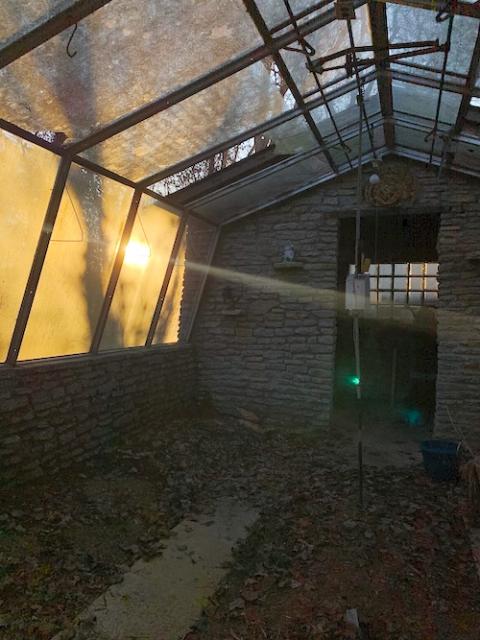Late winter during a mid-afternoon walk in Pewee Valley, Kentucky (Courtesy of Kiara Quintanar)
Editor's note: Notes from the Field includes reports from young people volunteering in ministries of Catholic sisters. A partnership with Catholic Volunteer Network, the project began in the summer of 2015. This is our 11th round of bloggers: Celine Reinoso is a Loretto Volunteer in El Paso, Texas, and Maria Longo is a Notre Dame AmeriCorps volunteer in the Bronx, New York. This is Celine's first blog post. Read more about her.
At a luxurious manor in the woods of Louisville, Kentucky, the Loretto Volunteers explored ways to unpack whiteness and white normativity within ourselves and developed anti-racist tools to bring to our respective communities and workplaces. James and Zenique from Undo Bias Consulting made space for honest and vulnerable "emotional liberation" to learn what each person was carrying into the Feb. 20-24 retreat. We sat in the discomfort of acknowledging racial stereotypes and thought about how we have personally engaged in white culture tendencies and white supremacy.
Having structure for emotion, something that is so unstructured and undefined, helped us articulate personal concerns and call out institutional systems that allow us to uphold those tendencies and microaggressions. To create a safe space for us four volunteers who are women of color, Zenique took us into a separate room for a person-of-color, or POC, caucus. To help us unlearn the term "minority," James and Zenique referred to our group as the "global majority," and those who identified as white were in the "global minority." Until I was given an all-POC space during this midyear retreat, I didn't know it was something I needed in my white-dominated program.
Generally, I sit quietly on the introverted side of the human personality spectrum. During our POC caucus, however, I used the voice I usually suppressed during our large-group discussions. I found myself speaking freely about my experience as a first-generation American and queer woman of color in a program that is 80% white. I had been self-conditioned to listen in silence to the dominant voices in the room for fear of being thought of as "too different" or "confrontational." In that all-POC space, however, I finally felt like I had the dominant voice and nods of affirmation.
Having attended a private Catholic university in St. Louis, Missouri, I am used to navigating white-dominated spaces. During moments when I would feel especially isolated, I learned to find comfort in my silence and passivity. When I began my service year with the Sisters of Loretto, I didn't think anything of it when all of Loretto leadership and volunteer staff were people who identified as white, when the anti-racist workshop at opening retreat was facilitated through a white lens, or when the majority of the Loretto community in El Paso were white women. I thought I was comfortable in those settings and that my experiences were simply microcosms of the white-dominated world I would navigate in the future. It took six months of living in an intentional community with my two Mexican American roommates in El Paso and Zenique's presence — our first facilitator who was a woman of color — to make me realize I was wrong.
Advertisement
During our caucus, we voiced concerns about how the program has had multiple hiring opportunities in the past year, and each time, a white person was hired. We pointed out that three POC volunteers make up the intentional community in a predominantly Latinx city along the U.S.-Mexico border, but they must find support in an all-white program staff. The disparity between the communities El Paso volunteers serve and the all-white staff members we report to and reflect with, we realized, was jarring. Moving forward, we want to push for more support of POC in the program, especially when one might find themselves isolated in a house of all-white volunteers.
We did not address these issues to call blame or to demand immediate change, but to spark a conversation that considers the root of these decisions and the institutional racism the program has always operated in. If we want to look at the racial biases in the volunteer program, it is imperative that we also look at the broader system the Loretto Volunteer program is only a small part of.
The Sisters of Loretto, an order of nuns based in Nerinx, Kentucky, is no stranger to the racial injustice familiar to the history of U.S. Catholicism. Laura Michele Diener for Numéro Cinq magazine revealed that the location of the Loretto motherhouse is land that was bought and stolen from the Shawnee and Cherokee tribes — along with the families and individuals who inhabited the property. Diener detailed that the community continued to purchase and own slaves for several decades after.

Golden hour through the glass of an abandoned greenhouse on the retreat property in Louisville, Kentucky (Celine Reinoso)
Shannen Dee Williams' research on anti-black racism among Catholic sisters in the United States included the Sisters of Loretto in the list of women religious organizations that excluded black women from the vowed community. White supremacy is deeply grounded in the roots of the Loretto community and has influenced past anti-integration and discriminatory acts in other Loretto schools around the country. Given our greater organization's history, it's no surprise that the program is unable to holistically support volunteers who identify as people of color.
The separate and safe space from the caucus allowed for ideas to flourish, from complaints to constructive criticism. Afterward, Zenique posed questions to the white caucus, asking, "Did you notice the pattern in hiring? If so, did you do anything about it?" An open conversation led us to ask leadership, "Where are you recruiting applicants?", "What benefits are you offering?" and "Is the job description and commitment matched by the pay?" My hope is that these questions lay a foundation for radical, systemic change to better support future volunteers of color.
I recognize that institutional racism has taken hundreds of years to construct and embed itself into our subconscious decisions and may take hundreds more to unlearn and undo. Having difficult conversations where all participants are liberated to speak their truth, conditioning ourselves to use anti-white normativity language, or calling ourselves and our institutions out for engaging in white dominant culture is only the beginning of the next hundred years it will take for the "global majority" to become just "majority." But as long as we sit quietly, unmoved and indifferent, I and other volunteers of color will remain the "minority" in Catholic spaces rooted in racism — spaces where whiteness is the lens we must conform our eyes to see through and where speaking out hurts our throats more than the oppression of silence.
2019-2020 Loretto Volunteers (Courtesy of Amy Maltz)
[Celine Reinoso is a Loretto Volunteer in El Paso, Texas, working at Villa Maria, a transitional homeless shelter for women.]








